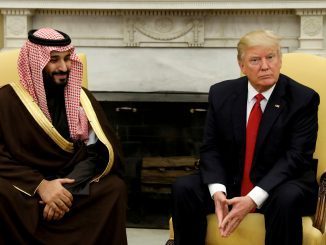
Egypt’s Abdel Fattah Al-Sisi issued a decree offering exceptional pensions to non-commissioned officers and former conscripts in the Armed Forces and their dependents, adding to a series of military privileges that have been expanding since the 2013 military coup.
Meanwhile, anti-Sisi protests continued for the third day in a row in several suburban and rural areas of Egypt, while security forces detained hundreds of people for participating in previous protests.
Sisi also ordered the creation of a medal to honor officers who participated in or contributed to Operation Sinai, which was launched in 2018 with a stated aim of ending terrorism in the province of North Sinai but has had dire consequences for the local population, including the razing of homes and farmland and the forcible disappearance of locals including children.
Militant insurgency in the province has intensified since 2013. Wilayat Sinai or Sinai Province, an IS affiliate, has targeted army and security officers and conscripts, as well as civilians who allegedly cooperate with the Egyptian state.
New anti-Sisi protests for 3rd. day in a row
Protests against Egypt’s Abdel Fattah al-Sisi have continued in several suburban and rural areas of Egypt, while security forces detained nearly 200 people for participating in previous protests.
New protests against Al-Sisi’s government broke out in several towns and cities in Egypt on Monday night and Tuesday afternoon as security forces detained dozens of people who had taken part in previous demonstrations.
Protests took place in the Cairo suburbs of Maadi, Helwan, and Shubra Al-Kheima, as well as in the towns of Ayyat, Abu al-Numros, Badrashin, and Atfih in Giza province, which lies to the west and south of Cairo.
In Upper Egypt, protests were seen in Dar al-Salam in Fayyum province and the village of Hawarta in Minya province.
Video shared on Twitter by Mohamed Ali showed protesters in Badrashin taking control of a police car
The protesters chanted slogans including “Get out Balaha!” using a disparaging nickname for Sisi – and “We’re not leaving until Sisi leaves!”
Mohamed Ali, an Egyptian businessman-turned-activist, last week called on people to protest on 20 September, the first anniversary of the “Palace gate” protests, which followed his revelations about Sisi’s alleged corruption.
Ali last year said that Sisi had used public funds to build luxurious palaces for himself and family with Sisi claiming they were “for the country”.
While security forces locked down the streets and squares of Cairo to forestall any potential protest on Sunday, they did not seem as prepared for Monday night’s protests in rural and suburban areas.
In Badrashin, protesters managed to seize a police vehicle, while in Hawarta, in Minya province, they overturned another.
Security forces used tear gas and water cannon to disperse the demonstrations, while 25 protesters were reportedly arrested in Badrashin.
Meanwhile in the Atfih area of Giza, 170 people were detained by security forces over their participation in previous protests, a legal source told The New Arab’s Arabic-language service.
On Sunday, hundreds of people in the village of Kadiya in the area protested against Sisi and chased police out of the village, overturning their truck.
The legal sources said that state prosecutors had levelled charges against the protesters including “membership in a forbidden organization” and “misusing and spreading rumors on social media”.
The Egyptian government has detained tens of thousands of suspected dissidents ever Sisi, a former general and defense minister, rose to power following a 2013 military coup against Egypt’s first democratically elected president, Mohammed Morsi.
This has mostly deterred people from participating in anti-government protests.
In addition to corruption, inequality, and authoritarianism, many Egyptians have recently been angered by government plans to demolish thousands of unlicensed buildings across the country, potentially leaving their residents homeless.
Last Sunday, hundreds of anti-government protesters took to the streets in the Egyptian governorate of Giza and some other governorates, including Cairo, Alexandria, El-Mahalla and others on Sunday, despite heightened security in the country in advance of anticipated demonstrations.
Video clips circulating on social media showed the demonstrators holding banners and chanting slogans calling on Egypt’s Abdel Fatah el-Sisi to step down. Others set a police car on fire while some threw stones at security forces who tried to stop them.
Egypt went into high alert after former Egyptian army contractor Mohamed Ali called for anti-government protests on September 20 to commemorate a year since similar demonstrations were launched in the Middle Eastern country.
In a rare show of dissent, thousands of people rallied in cities across Egypt in September last year, demanding the resignation of el-Sisi following a call for protests by Ali, also an actor and businessman who said his company used to carry out projects for the Egyptian military.
In response, authorities launched the “biggest crackdown” under el-Sisi’s rule, according to Amnesty International, rounding up more than 2,300 people.
Security services pre-empted Sunday’s protests by launching a campaign of arrests that included political figures, including the left-wing political thinker Amin al-Mahdi, and a number of activists, especially in the eastern city of Suez.
Several social media users also reported cafes being forced to close over the past week.
In addition to the government crackdown on opposition figures and activists, pro-government media called people who planned to demonstrate part of an external conspiracy aimed at overthrowing the government.
Ali, who lives in self-imposed exile in Spain, had expected a strong response to his calls for demonstrations against the government and over deteriorating living conditions.
Ali also said: “If five million people took to the streets [on Sunday], no one would be arrested at all.
“Last time [September 2019], the demonstrators returned to their homes, which made it easier for the regime to arrest them,” he added.
Egypt outlawed all unauthorized demonstrations in 2013 after el-Sisi, as defense minister, led the military’s overthrow of democratically elected President Mohamed Morsi following mass demonstrations.
Since then, Egyptian authorities have imprisoned and prosecuted thousands of people, according to human rights groups, with a nationwide crackdown intensifying after el-Sisi was first elected in 2014 with 97 percent of the vote.
Some Egyptian activists have warned of the danger protesting poses to the lives of demonstrators, given what they called a tight grip on security by authorities.
On January 25, 2011, the Egyptian people began their revolution that toppled longtime president Hosni Mubarak.



